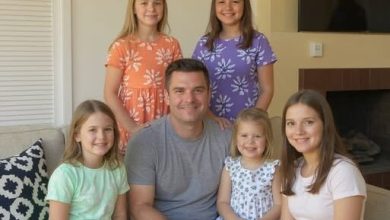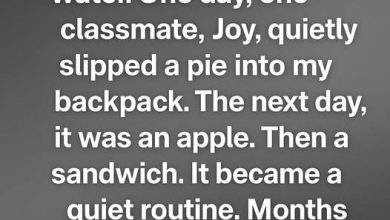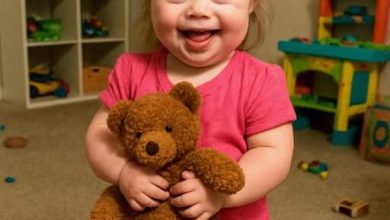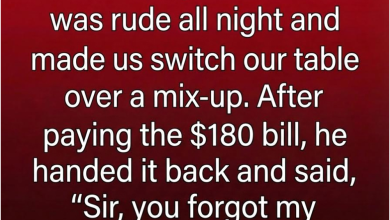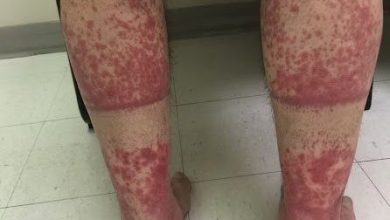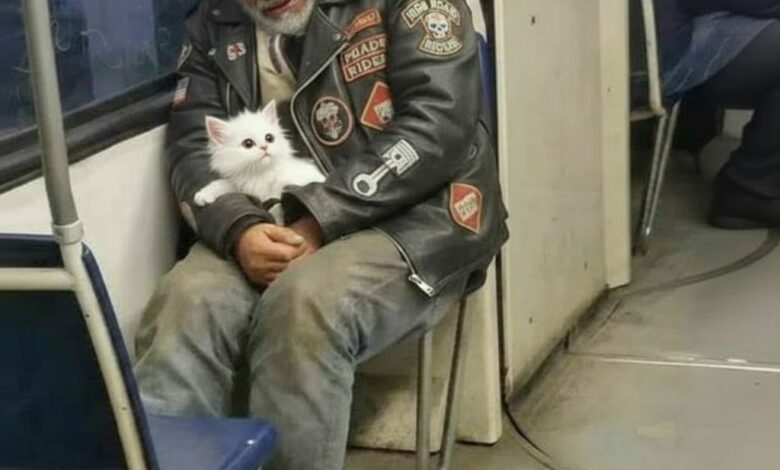
The biker sitting across from me on the subway was crying.
The biker sitting across from me on the subway was crying. Not just tearing up—full-on sobbing into a tiny orange and white kitten pressed against his chest.
His leather vest was covered in patches, his hands were scarred and rough, and his beard was streaked with gray. He had to be at least sixty-five, maybe older. And he was completely falling apart.
Everyone else on the train was pretending not to notice, doing that typical city thing where you look everywhere except at the person having a moment.
But I couldn’t stop watching. There was something about the way he held that kitten—so carefully, like it was made of glass—that made my throat tight. The little thing was purring so loud I could hear it over the rumble of the train.
The woman next to him—overdressed for the subway in a business suit—kept glancing at him with disgust.
Finally, she stood up and moved to a seat further down the car, shaking her head.
That’s when the biker looked up, tears streaming down his face, and said something that made everyone within earshot go completely silent.
“I’m sorry,” he said to no one in particular, his voice breaking. “I just… I haven’t held anything this small and alive in forty-three years.”
Nobody said anything at first. The train rattled on through the tunnel. The biker wiped his eyes with the back of one hand, still cradling the kitten with the other. It had its tiny paws pressed against his chest, kneading his shirt, completely content.
I don’t know what made me do it, but I moved seats. I sat down next to him. “You okay, brother?” I asked quietly.
He looked at me with red-rimmed eyes and let out a shaky laugh. “No. Not really. But I think maybe I will be.” He stroked the kitten’s head with one finger.
“Found this little guy in a dumpster outside the hospital. Just sitting there in a cardboard box, crying his head off. Couldn’t have been more than a few weeks old.”
“You taking him home?” I asked.
“I don’t have a home,” he said simply.
“Been sleeping rough for three years now. Lost my apartment when I couldn’t work anymore—bad back, messed up knees from the bike accident. But yeah, I guess I’m taking him with me. Can’t leave him to die.”
The kitten mewed and climbed up closer to his neck. The biker’s face crumpled again.
“Sorry. God, I’m sorry. I don’t know why I can’t stop crying.” But I thought I did. There was something in his eyes that I recognized—the kind of grief that lives in your bones, the kind you carry forever.
“What happened forty-three years ago?” I asked quietly.
He was silent for a long moment. The train pulled into a station, doors opened, people got on and off.
The kitten stayed curled against his chest, purring like a little motor. Finally, the biker spoke.
“My daughter was born forty-three years ago. September 14th, 1980. She weighed five pounds, two ounces. Had this little tuft of orange hair, just like this kitten.”
His voice caught. “I held her for seventeen minutes. That’s all I got. Seventeen minutes before my ex-wife’s parents took her away.
They said I wasn’t fit to be a father. Said bikers were criminals and degenerates. Said they’d make sure I never saw her again.”
My stomach dropped. “They took your baby?”
“Got a lawyer, a judge who agreed with them, and full custody awarded to my ex-wife with a restraining order against me. I was twenty-two years old, working construction, riding with a club on weekends.
I wasn’t perfect, but I wasn’t what they said I was. I loved my little girl more than anything in this world.” He pressed his face against the kitten’s fur.
“I tried to fight it. Spent every dollar I had on lawyers. Went to every court date. Didn’t matter. Last time I saw her, she was six months old. Her grandmother brought her to a supervised visit and wouldn’t let me hold her. Said I’d already done enough damage.”
“Jesus Christ,” I whispered.
“I looked for her for years. Sent letters to the address I had—every single one came back. Sent birthday cards. Sent Christmas presents. All returned.
I hired a private investigator when she turned eighteen, thinking maybe she’d want to meet me. Found out my ex-wife had remarried when my daughter was two. Her new husband adopted her. Changed her name. They told her I was dead.”
His voice broke completely. “She thinks I’m dead. She’s grown now, forty-three years old, maybe has kids of her own. And she thinks her father died before she could remember him.”
The kitten climbed up and rubbed its face against the biker’s beard. He closed his eyes and more tears spilled down his cheeks.
“This little guy started crying in that box and I heard him from across the parking lot. Same sound my daughter made in the hospital. That little newborn cry. And I just…” He couldn’t finish.
“You picked him up,” I said.
“I picked him up and he stopped crying. Just looked at me with these big eyes and started purring. And I thought… I thought maybe I could keep something alive this time.
Maybe I could be good for something.” He laughed bitterly.
“Stupid, right? I’m homeless. I’ve got maybe fifteen dollars to my name. I’m taking a kitten I can’t feed to a place I don’t have.”
“That’s not stupid,” I said. “That’s love.”
An older woman across from us had been listening. She reached into her purse and pulled out a twenty-dollar bill. She leaned forward and pressed it into the biker’s hand. “For the kitten. For food.”
The biker stared at the money like he’d never seen cash before. “Ma’am, I can’t—”
“You can,” she said firmly. “And you will. That baby needs you.”
A younger guy in a hoodie pulled out his wallet. “Here’s another twenty. Get him to a vet, man.” A woman with two kids opened her purse. “I have thirty. Please take it.”
Within two minutes, six different people had given the biker money. He sat there with nearly two hundred dollars in his lap, crying harder than before, the kitten still purring against his chest. “I don’t… I don’t know what to say.”
“Say you’ll take care of him,” the older woman said. “Say you’ll give him the love you couldn’t give your daughter.”
The biker nodded, unable to speak. He held the kitten up and looked at its tiny face. “You hear that, little man? You’re stuck with me now. I’m gonna take care of you. I promise.”
The train pulled into my stop. I didn’t want to leave, but I had to. Before I got off, I turned back. “What are you going to name him?”
The biker smiled for the first time—small, sad, but real. “Hope. I’m gonna name her Hope. Because that’s what she gave me when I didn’t think I had any left.”
I nodded, my own eyes burning. “Take care of each other.”
“We will,” he said, stroking the kitten’s head. “We will.”
As the train doors closed, I saw him stand up with new purpose, carefully tucking Hope inside his vest to keep her warm.
Six strangers stood up with him, talking to him, writing down information, offering help. The woman in the business suit who’d moved away earlier came back. I couldn’t hear what she said, but I saw her hand him a business card.
The last thing I saw before the train pulled away was the biker standing in the middle of a small crowd of people, all of them gathered around him and the kitten, all of them wanting to help. He wasn’t crying anymore.
For forty-three years, he’d carried the weight of losing his daughter alone. For forty-three years, he’d believed he wasn’t good enough to be a father. But that day, on a random subway car, with a kitten that needed him and strangers who saw his heart, maybe he finally understood what the rest of us could see clearly.
He was exactly the kind of father his daughter should have had. And now, finally, he’d get the chance to prove it—even if it was to a tiny orange and white kitten who’d been thrown away in a box.
Sometimes the family we save is the family that saves us right back.
